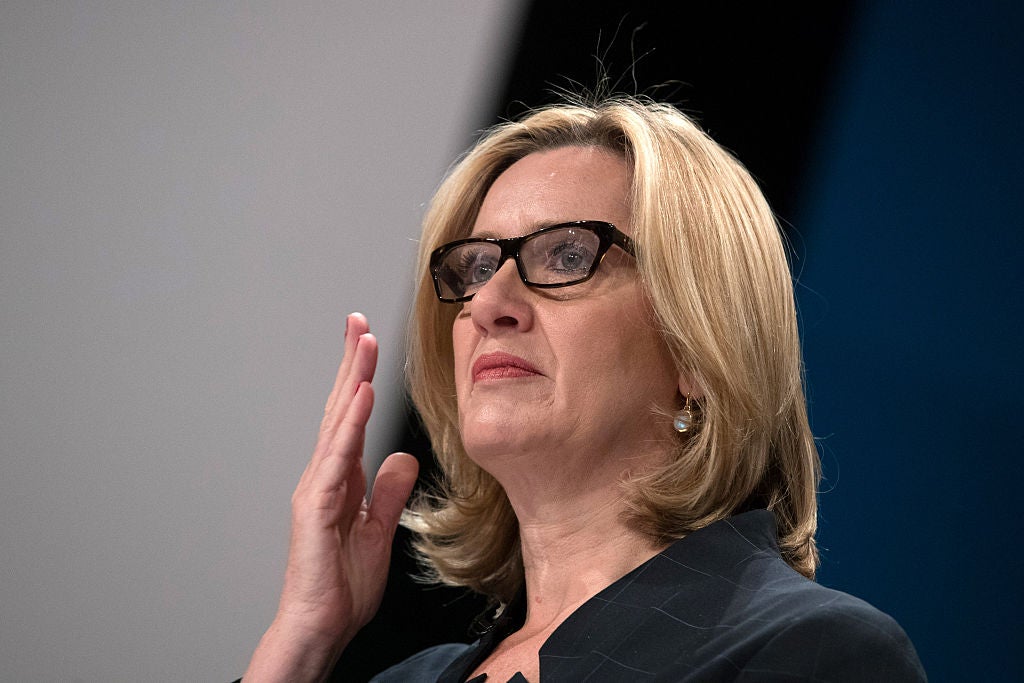Amber Rudd announces tough new measures against dangerous stalkers
If the stalker breaks conditions placed on them by a court, they could be jailed for up to five years

Your support helps us to tell the story
From reproductive rights to climate change to Big Tech, The Independent is on the ground when the story is developing. Whether it's investigating the financials of Elon Musk's pro-Trump PAC or producing our latest documentary, 'The A Word', which shines a light on the American women fighting for reproductive rights, we know how important it is to parse out the facts from the messaging.
At such a critical moment in US history, we need reporters on the ground. Your donation allows us to keep sending journalists to speak to both sides of the story.
The Independent is trusted by Americans across the entire political spectrum. And unlike many other quality news outlets, we choose not to lock Americans out of our reporting and analysis with paywalls. We believe quality journalism should be available to everyone, paid for by those who can afford it.
Your support makes all the difference.Home Secretary Amber Rudd has unveiled new “stalking protection orders” in a bid to clamp down on perpetrators who obsessively follow and torment their victims.
The measure will see police handed new powers to order people to stop stalking activity, even if they have never been arrested or charged with any offence.
If the stalker breaks conditions placed on them by a court, they could be jailed for up to five years.
The Home Secretary said: “Stalking can have devastating consequences and I am determined that we do all we can to protect victims from these prolonged and terrifying campaigns of abuse that can last years, leaving many people too afraid to leave their homes and unable to get on with their lives.
“Four years ago this Government created specific stalking offences to ensure those responsible face justice.
“Today I want to go even further and offer protection at the first signs of stalking, stopping offenders in their tracks.”
Under the proposals stalkers will be hit with court orders as soon as their victims raise the alarm.
Suspects could be ordered to stay away from their targets or have their internet use restricted, amid fears the explosion in social networking has fuelled a rise in cases. Other conditions could see stalkers required to attend a rehabilitation programme or seek treatment for mental health issues.
The orders will be applicable even if the stalker has not yet been arrested or charged, allowing people protection while police continue to gather evidence for a criminal case ahead of possible prosecution. Breaching the orders will be a criminal offence with a maximum sentence of five years in jail.
They are aimed particularly at halting “stranger stalking” before it escalates and are supposed to build on Domestic Violent Protection Orders, which were rolled out in 2014 to clamp down on abusive partners and spouses.
Statistics suggest one in five women and one in ten men will be affected by stalking in their lifetime, while the National Stalking Helpline has responded to almost 14,000 calls since it was established in 2010.
In the 12 months to June 2016, police recorded 4,168 stalking offences, an increase of 32 per cent on the previous year.
Pop star Lily Allen, Labour MP Stella Creasy and BBC Newsnight presenter Emily Maitlis are among the many high-profile public figures to suffer the unwanted attentions of stalkers.
Assistant Chief Constable Garry Shewan, National Police Chiefs’ Council lead for stalking and harassment, said: “We want to stop stalkers in their tracks.
“The launch of stalking protection orders will help us intervene earlier and place controls on perpetrators to prevent their behaviour escalating while the crime is investigated.”
Join our commenting forum
Join thought-provoking conversations, follow other Independent readers and see their replies
Comments